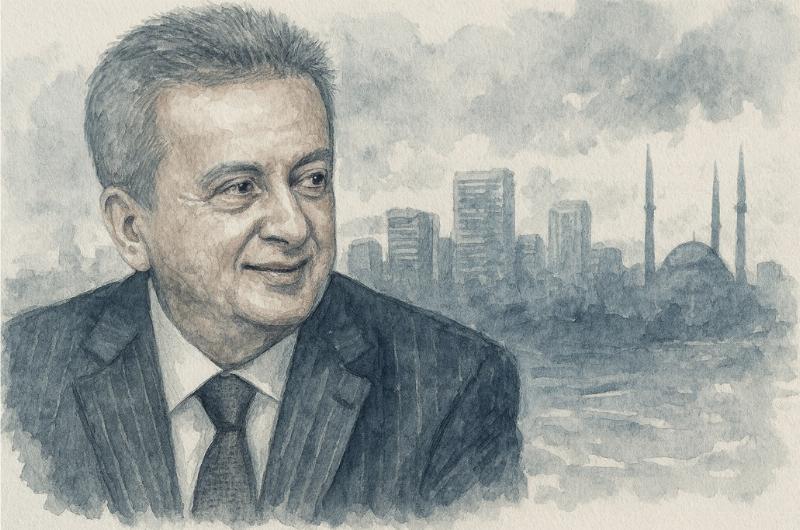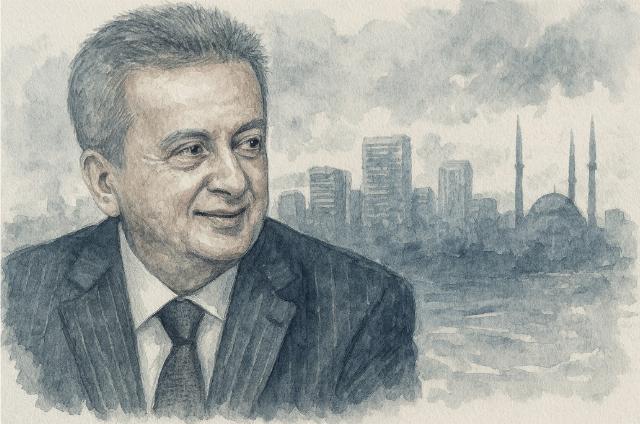


The $14 million bail of Riad Salameh, Lebanon’s disgraced central banker, should have been a moment of reckoning. Instead, it proved what most Lebanese already knew: in Beirut, even justice is for sale. Bags of cash bought him freedom, while politicians and judges bought themselves silence. The case exposes a judiciary not failing, but functioning exactly as designed—to shield the powerful, punish the weak, and keep Nabih Berri’s corrupt order intact.
A governor in the dock
Salameh was once feted in Paris and Washington as the miracle worker of Beirut. For three decades, he ran Banque du Liban, praised for stability in a country otherwise defined by chaos. But beneath the surface, he presided over a financial edifice that resembled a Ponzi scheme, keeping dollars flowing in while politicians drained them out. When the system collapsed in 2019, ordinary Lebanese were locked out of their deposits, while the politically connected spirited their fortunes abroad.

Image created using AI.
International patience eventually snapped. In August 2023, the U.S. Treasury sanctioned him under Executive Order 13441, accusing him of corrupt practices that “contributed to the breakdown of the rule of law in Lebanon.” Britain, Canada, and many in the EU quickly followed with their own sanctions. Lebanese prosecutors piled on charges of money-laundering, illicit enrichment, forgery, and criminal conspiracy.
If convicted, Salameh faced years in prison. Bail was supposed to be a procedural guarantee—not a golden escape hatch.
The puzzle of $14 million
Initially set at $20 million, Salameh’s bail was mysteriously reduced to $14 million. Even so, it remained the largest in Lebanese history. The shock was not just the number, but the method. Under sanctions, with frozen accounts and asset seizures, how could Salameh produce $14 million in hard currency?
The answer played out in broad daylight. According to multiple reports, his lawyer, Mark Habka, arrived at the courthouse with bags of cash stacked high enough to buy his client’s freedom. Judges did not ask for proof of origin or legality. They simply nodded it through, laundering impunity in public view.
The irony was brutal. Millions of Lebanese still queue for meagre withdrawals of $400 a month from frozen accounts. Yet their former central banker could, from his cell, marshal $14 million in cash. The contrast illustrated Lebanon’s two-tier system: impoverishment for the many, impunity for the few.
For a man already prohibited from dealing in U.S. dollars to produce $14 million in cash for bail—what does that say about the credibility of U.S. sanctions enforcement in Lebanon? And why should those who facilitated this transaction—the lawyer who carried the bags, the judges who accepted them, and the political patrons who shielded it—not also be held responsible for potentially violating U.S. sanctions? For Washington, the message could not be clearer: Lebanon’s courts answer not to law, but to money and power.
Following the money
Where did the money come from? Those familiar with Salameh’s methods point to the offshore labyrinth European prosecutors have been unraveling for years. Transfers through HSBC Private Bank Suisse, Panama, and BVI shell companies, and real-estate vehicles in Paris and Munich, all of which feature in files obtained by Swiss NGO Public Eye. Watchdogs have documented how Geneva bankers ignored red flags for over a decade. Lebanese banks, many tied to political families, are suspected of facilitating discreet transfers under the guise of “investment dealings.”
The message was clear: the system that collapsed in 2019 still works—for those who built it.
Prosecutors’ discretion
And it’s here that the role of the judiciary comes into focus. Prosecutor General Judge Jamal al-Hajjar narrowed the case to a single embezzlement charge, precisely the one in which bail could be granted. More serious accusations of money-laundering and illicit enrichment, backed by international evidence, were left to languish.
Selective justice is no accident. It reflects a calculation: pursue just enough to quiet public outrage, but never so much that elite privilege topples. Though a Sunni by confession, al-Hajjar clearly takes his cues from Nabih Berri’s Amal Movement — a reminder that sectarian labels often mask deeper loyalties of patronage.
Under his watch, Berri’s Amal movement appointed judges are allowed wide latitude to operate unchecked. One example is Judge Zaher Hamadeh, once the Public Prosecutor at the Beirut Court of Appeal and now promoted as chief prosecutor in the South. He is notorious for abusing his office with partisan zeal for the Amal Movement.
Enter Nabih Berri
If one man epitomizes Lebanon’s system, it is Nabih Berri, Speaker of Parliament for more than three decades. A warlord-turned-statesman, he has mastered the art of balancing sectarian spoils with political survival. Salameh has long been among his confidants.
Berri’s fingerprints are all over the outcome in Salameh’s case. Judges answer to political patrons; prosecutors follow cues from above. Few doubt that the Speaker leaned on the system to ensure his old friend was spared humiliation. Protecting Salameh was not loyalty but survival. For Berri knows that if Salameh ever spoke freely, the Speaker’s own empire of corruption could collapse overnight.
Salameh was the treasurer of the political class, the man who conjured dollars from thin air to finance decades of patronage. He knows which ministers parked fortunes in which Swiss accounts, which banks facilitated which transfers, and how the pyramid of “financial engineering” kept the system afloat. If compelled to talk, he could sink half the establishment. Better, then, to keep him comfortable — and quiet.
A fragile façade of legality
Salameh’s release was dressed up as legality: bail, conditions, and a one-year travel ban. But the symbolism of his exit told the real story. An armed convoy whisked him away like a head of state, not a defendant.
International observers were aghast. American and European officials privately fumed that their painstaking sanctions were being undermined by Lebanese courts. But few were surprised. The case laid bare the structural reality: Lebanon’s judiciary is not an independent arbiter, but an extension of political power.
The cost of complicity
For Lebanon, the consequences are dire. Public trust in institutions, already shattered, sinks further. The bail affair signals to ordinary citizens that justice is not merely absent but hostile to their plight. Foreign investors, meanwhile, read it as confirmation that reforms are a mirage. Aid, reconstruction, and debt relief will remain hostage to credibility—and credibility is precisely what Lebanon lacks.
For Salameh, the bail was more than freedom. It was a tacit bargain: silence in exchange for protection. As long as he keeps the secrets of the ruling class buried, the class will shield him.
The bottom line
Lebanon’s tragedy is not only economic collapse but the capture of every institution by those who profited from it. Salameh’s $14 million bail crystallizes that truth.
In any normal country, the arrival of sacks of dollars in a courthouse would trigger arrests. In Lebanon, it bought a procession of bodyguards, a signed release, and a smirk at the system’s collapse. The delivery of bail was not merely a transaction; it was a declaration that power still buys impunity.
As one senior U.S. official put it: “Nabih Berri has been a central protector of Lebanon’s corrupt order for decades. If accountability is the goal, he cannot remain untouchable.”
If Washington and its partners are serious, they must widen the sanctions net. Riad Salameh is already designated. But the people involved in Salameh’s walking out of court after handing over $14 million should be next. All of them facilitate corruption and obstruction of justice. Until that happens, the message remains clear: in Lebanon, corrupt money is not hidden in offshore accounts. It is wheeled openly into court, one bag at a time.
